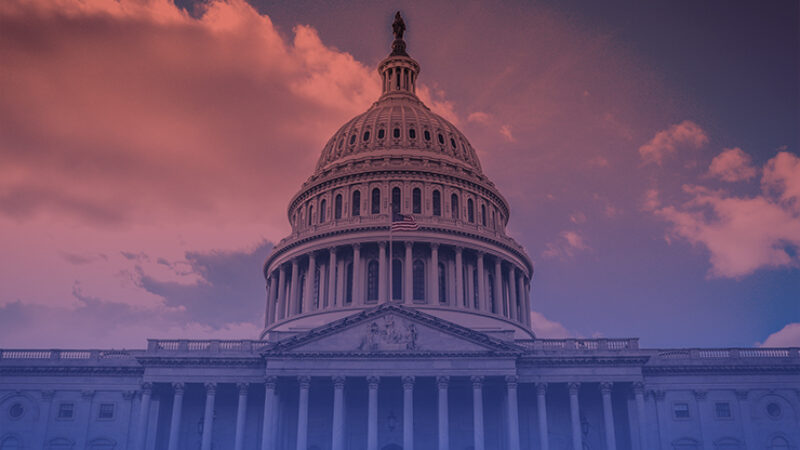Letter announcing the Power of the Purse coalition
- July 1, 2020
Organizations across the ideological spectrum announce the formation of a coalition to support Congress in asserting its own power over the purse.
“Dear Speaker Pelosi, Leader McConnell, Leader McCarthy, and Leader Schumer:
We write to you collectively in our capacity as founding members of the Power of the Purse Coalition, an ideologically diverse group of organizations dedicated to preserving and promoting the constitutional role of Congress.
As the 2021 fiscal year appropriations season is upon us, we encourage you to use this opportunity to advance policies and reforms that would strengthen Congress’s primacy over federal spending and tax decisions. Specifically, we recommend embracing a series of reforms that include but are not limited to:
- Reprogramming: The Executive Branch has too much discretion in the reprogramming of congressionally appropriated taxpayer funds. Congress should consider implementing more transparency requirements and restrictions on this budget authority.
- Comprehensive inventory of federal programs: If Congress is going to make good decisions in the exercise of its power of the purse, a prerequisite should be that it and the public at large know the full scope of programs and activities that are being funded by taxpayers. Congress should use appropriations bills to ensure that such an inventory is finally created and made available to the public.
- Apportionment transparency: The apportionment process is legally binding on federal agencies and yet it is entirely internal to the Executive Branch. Congress must require more transparency around apportionment decisions in order to know what the Executive Branch is doing with dollars after they have been appropriated by Congress.
- Oversight of mandatory spending: As an ever-increasing percentage of federal spending has transitioned to the mandatory spending category, Congress has abdicated much of its responsibility for making hard decisions on the appropriation of taxpayer dollars.Congress should consider mechanisms that would rebalance the elements of the federal budget that operate on auto-pilot (mandatory) and those which Congress must proactively account for. In this way, Congress will be able to more fully exercise its power of the purse and can be held responsible by the public for its decisions.
Our coalition was formed to support Congress in asserting its own power over the purse. We believe strongly that these reforms would restore the constitutional balance of powers and work to reaffirm the rule of law. Indeed, in Federalist No. 58, James Madison wrote that the “power of the purse may, in fact, be regarded as the most complete and effectual weapon with which any constitution can arm the immediate representatives of the people.”
We believe these to be issues of constitutional principle, not politics. The founders purposely separated the power of the purse from the executive branch’s power of the sword to protect our democracy from declining into tyranny. As Alexander Hamilton explained, “where the purse is lodged in one branch, and the sword in another, there can be no danger.”
Enacting any true reforms into law ultimately requires strong cross-partisan cooperation, and a commitment to the unique powers of the legislative branch. Only then can we recalibrate the balance of inter-branch power and, in so doing, yield a federal government more accountable, transparent, and responsive to the needs of the American people. We believe the reforms we have outlined would be a great start toward putting us on that path.
Sincerely,
National Taxpayers Union, Project on Government Oversight, Protect Democracy, R Street Institute, FreedomWorks, Demand Progress
cc: Members of Congress”
About the Power of the Purse Coalition
For many decades, Congress has given up significant control over one of its most fundamental enumerated powers, the power of the purse, by delegating budget authority to the executive branch and engaging in insufficient oversight over federal spending. Across both Democratic and Republican administrations, the executive branch has aggrandized its own power to make spending decisions.
The devolution of Congress’s primacy over the power of the purse has resulted in executive branch abuse, including spending taxpayer funds in ways Congress has not authorized or failing to allocate duly appropriated funds to the programs and activities that Congress has enacted. It also undermines the rule of law when spending judgments are the products of executive fiat and informal decision-making by agencies rather than of a deliberative process reflected in legislation.
We believe Congress must reclaim its own power through legislative reforms and more robust oversight authority to limit executive overreach. Congress must understand and correct, as necessary, how the executive branch implements legislatively-created programs. As executive agencies administer appropriated funds, they must demonstrate that they are managing federal funds only as Congress directs. For example, the executive branch must regularly report how it is using, or proposing to cancel or defer, budget authority.
Accordingly, we urge reforms consistent with the following framework:
- When Congress abdicates its tax and spending responsibilities, it leaves an unchecked executive branch likelier to abuse power and squander scarce resources.
- Congress’s weakness in wielding its power of the purse has been both structural and bipartisan, and thus solutions must, too, be structural and should be supported by people across the political spectrum.
- Increasing congressional authority over the purse does not require taking a position on the size or scope of government.
- Congress has a constitutional responsibility to oversee how the executive branch implements its tax and spending decisions, and this oversight power must be reinforced.
- Congress must have improved tools to ensure that the executive branch follows the law that the legislative branch writes, while balancing the executive’s need for flexible and effective mechanisms to implement Congress’s wishes within the confines of the law.
Related Content
Join Us.
Building a stronger, more resilient democracy is possible, but we can’t do it alone. Become part of the fight today.
Donate
Sign Up for Updates Sign Up for Updates
Explore Careers Explore Careers
How to Protect Democracy How to Protect Democracy


